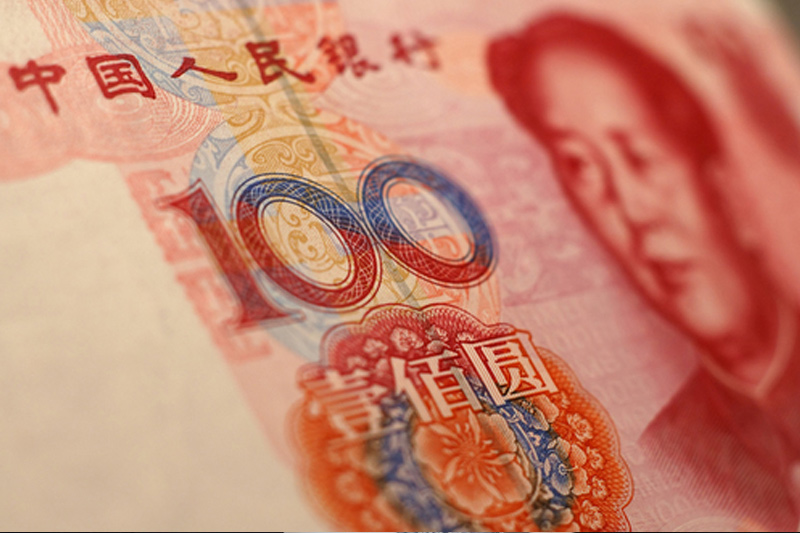(Bloomberg) -- China is unlikely to let the yuan weaken past the key psychological level of 7 per dollar any time soon, according to market observers.
Just three of 18 traders and analysts surveyed Wednesday and Thursday said the Chinese currency will breach that milestone in 2018, though a majority see it happening by the middle of next year. Falling beyond 7 for the first time in a decade would further strain relations with the U.S. and spur capital outflows, some respondents said. The yuan fell 0.37 percent to 6.9146 per dollar Friday.
The yuan edged close to 7 last week after the People’s Bank of China announced a cut to the reserve requirement ratio for a fourth time this year, reflecting a growing divergence with U.S. monetary policy. Pressure on the currency, which has tumbled 9 percent over six months, eased in the past few days amid reports Donald Trump and Xi Jinping plan to meet in November and that U.S. Treasury Secretary Steven Mnuchin is being advised not to name China a currency manipulator.
How bears sped up building options wagers betting the yuan will hit 7
“We expect that the trade uncertainty will keep the yuan weak, but the Chinese authorities likely want to avoid a situation of snowballing negativity surrounding the currency,” said Julian Wee, an investment strategist at Credit Suisse (SIX:CSGN) Private Banking in Singapore. “Existing capital controls and improving economic data from policy stimulus should help to partially counter the negative impact of the trade tensions.”
Including the three who see a break of 7 this year, 11 respondents expect the yuan to pass that mark by the end of June, citing reasons from a stronger greenback to a worsening trade conflict. There’s some disagreement on the consequences of a move beyond 7: Mizuho Bank Ltd.’s Ken Cheung said falling past that level would be “catastrophic to China’s economy and financial stability,” while Standard Chartered (LON:STAN) Plc’s Ding Shuang doesn’t foresee large outflows due to capital controls.
Here are some highlights of respondents’ views:
Mizuho Bank (Ken Cheung, senior Asian currency strategist)
- The yuan won’t likely break 7 this quarter; the PBOC will use “every means” to defend the currency, such as intervention and tighter capital controls
- Outflows and overshooting yuan weakness would be “catastrophic” to the economy and financial stability
- Foreigners would hesitate to invest heavily onshore if the yuan passes 7
Standard Chartered (Ding Shuang, Greater China and North Asia chief economist)
- Will likely breach 7 by the end of March; China may hold the line this year to keep the door open for trade negotiations with the U.S. and to prevent individual investors from buying foreign currency
- Large outflows may not materialize even if the yuan hits 7, as China may tighten control
- A fall past 7 could lead to weakness in emerging-market currencies
United Overseas Bank (Heng Koon How, head of markets strategy)
- Could break 7 in the first quarter, when exports may see more significant negative impact from the trade conflict
- China will continue to apply targeted fiscal stimulus and monetary support, which will keep the currency weak
- The PBOC will try to ensure stability in the exchange rate and limit the pace of depreciation; there’s a risk that outbound investment quotas will be temporary reduced or suspended
- Once the yuan breaks 7, stay cautious on emerging-market currencies and expect volatility
Malayan Banking Berhad (Fiona Lim, senior currency analyst)
- May break 7 as soon as this quarter, as the Fed continues to raise borrowing costs
- Depreciation can be slowed by using the counter cyclical factor in the fixing, selling the dollar offshore and issuing PBOC bills in Hong Kong
Bloomberg’s survey involved 12 strategists, economists and researchers based in Hong Kong, Shanghai, Beijing and Singapore, and six currency traders at Chinese banks. Survey respondents who agreed to be identified were from Scotiabank, Mizuho, Standard Chartered, DBS Bank Hong Kong Ltd., Australia & New Zealand Banking Group Ltd., Malayan Banking Bhd, China Financial Futures Exchange, United Overseas Bank, China Merchants Bank Co., Chinese Academy of Social Sciences, Natixis SA and Credit Suisse Private Banking.
(Updates yuan move in second paragraph.)
To contact Bloomberg News staff for this story: Tian Chen in Hong Kong at tchen259@bloomberg.net;Emma Dai in Hong Kong at edai8@bloomberg.net;Qizi Sun in Beijing at qsun62@bloomberg.net;Ran Li in Beijing at rli279@bloomberg.net
To contact the editors responsible for this story: Richard Frost at rfrost4@bloomberg.net, Will Davies, David Watkins
©2018 Bloomberg L.P.
